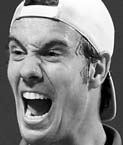France's Richard Gasquet, who tested positive for cocaine during the Miami Masters in March, was cleared to resume his career on Wednesday despite being handed a two-and-a-half month ban.
Gasquet had been provisionally suspended in May following a positive test of his A sample and the 'B' sample was also positive, the International Tennis Federation (ITF) said.
However, the ITF added that the 23-year-old will be able to return to action as from Wednesday, with the ban retroactive to May.

Gasquet had claimed that he had picked up traces of the substance after kissing a girl in a Miami nightclub.
"I am really happy, to put it simply, to return to the courts. It's a great joy. Justice has been done," said Gasquet, a former world No 7.
"It has been terrible in the last two months, an extraordinary pain. I couldn't go to either the French Open or Wimbledon."
The ITF said Gasquet's sample from the ATP event in Miami contained benzoylecgonine, a metabolite of cocaine banned in-competition under the World Anti-Doping Association's 2009 List of Prohibited Substance.
But the ITF tribunal accepted his plea of "no significant fault or negligence", the player having insisted that the cocaine entered his system through inadvertent contamination in a nightclub.
The ITF ruled that a longer ban would have been disproportionate.
Gasquet, who eventually did not play in Miami because of a shoulder injury, also retains his results, ranking points and prize money from events subsequent to Miami.
"The tribunal rejected the suggestion made by Mr Gasquet that, by virtue of his withdrawal prior to playing a match in Miami, the sample provided by him should be treated as having been collected out-of-competition," said an ITF statement.
"Such a test is to be treated as an in-competition test, even if the player withdraws before playing a match. The tribunal therefore found that Mr Gasquet had committed a doping offence."
The ITF then added it was satisfied with the Frenchman's explanation as to how the drug had entered his system.
"The tribunal accepted Mr Gasquet's plea of no significant fault or negligence, on the basis that he was able to demonstrate on the balance of probabilities how the cocaine entered his system (through inadvertent contamination in a nightclub the night before his scheduled match), and that, while he was at fault in exposing himself to the risk of such contamination, that fault was not significant," the statement added.
"It further ruled that, in the exceptional and 'probably unique' circumstances of the case, it would be unjust and disproportionate to impose a 12-month sanction on Mr Gasquet."
Gasquet, a 2007 Wimbledon semifinalist and a former top 10 player, retains his ranking of 32 in the world.
(AFP via Chna Daily July 17, 2009)